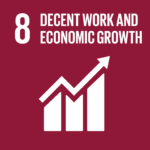Union Minister for Environment, Forest & Climate Change Bhupender Yadav underscored the transformative potential of India’s circular economy, predicting a market worth exceeding $2 trillion and the creation of nearly 10 million jobs by 2050.
At the 12th Regional 3R and Circular Economy Forum in Asia and the Pacific, Union Minister for Environment, Forest & Climate Change Bhupender Yadav underscored the transformative potential of India’s circular economy, predicting a market worth exceeding $2 trillion and the creation of nearly 10 million jobs by 2050.
RELEVANT SUSTAINABLE GOALS



Yadav described the transition to a circular economy as one of the most profound economic shifts since the Industrial Revolution, challenging the traditional “take, make, waste” production model. Instead, the circular economy promotes a system focused on resource efficiency, waste reduction, and sustainability, with the potential to contribute an additional $4.5 trillion to the global economy by 2030.
India’s Bid to Lead the Global Circular Economy Movement
During the forum, Yadav announced India’s formal bid to host the World Circular Economy Forum in 2026, reinforcing the nation’s commitment to driving sustainable development on a global scale. The 2025 edition of the event is scheduled to take place in São Paulo, Brazil, and India aims to host the following year.
The minister reaffirmed India’s firm stance on plastic waste management, citing the Plastic Waste Management Rules (2016) as a critical framework in addressing environmental concerns. He highlighted India’s 2022 ban on single-use plastics and emphasized the role of initiatives such as Mission LiFE and Eco-Mark Rules, which promote energy-efficient and eco-friendly products.
One of the key announcements at the forum was the launch of the SBM Waste to Wealth PMS Portal, a digital platform developed under the Swachh Bharat Mission (SBM) to enhance:
- Project monitoring
- Data management
- Resource sharing
The government also unveiled the IFC Document Reference Guide: Business Models and Economic Assistance for Municipal Solid Waste (MSW) Projects, which provides detailed insights into:
- Waste-to-electricity initiatives
- Biomethanation projects
- Bioremediation efforts
These guidelines serve as a blueprint for municipalities and private enterprises looking to implement large-scale waste management solutions.
In an effort to strengthen scientific collaboration in waste management, a Memorandum of Understanding (MoU)was signed between the Council of Scientific and Industrial Research (CSIR) and the Ministry of Housing and Urban Affairs (MoHUA).
Circular Economy Success Stories and Policy Frameworks
The forum also marked the unveiling of ‘India’s Circular Sutra: A Compendium of Best Practices in 3R & Circular Economy,’ a collection of successful case studies showcasing innovative approaches to the Reduce, Reuse, and Recycle (3R) framework. The compendium serves as a reference guide for urban local bodies and stakeholders interested in implementing circular economy principles at the local level.
Additionally, the Council on Energy, Environment, and Water (CEEW) presented its latest study on solid waste management in India’s largest cities, focusing on:
- Decentralized waste solutions
- Circular economy implementation
- Sustainable waste management practices
With urbanization accelerating and waste production increasing, India’s focus on circular economy policies and sustainable waste management is crucial. By integrating technology, policy frameworks, and stakeholder collaboration, the country is positioning itself as a global leader in circular economy practices.
You may also be interested in :
Recycling Pioneers Recognised at Plastics Recycling Awards India




